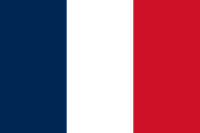Pre-1940 France/Post-1940 Vichy French/post-1944 France again Free French
Free French
France was a member of the Triple Entente when World War I broke out. A small part of Northern France was occupied, but France and its allies eventually emerged victorious against the Central Powers, at a tremendous human and material cost: the First World War left 1.4 million French soldiers dead, 4.29% of its population,[54] between 27 and 30% of the conscript classes of 1912-1915.[55]
The interbellum years were marked by intense international tensions an a variety of social reforms introduced by the Popular Front government (Annual leave, working time reduction, women in Government among others). France was occupied following the German Blitzkrieg campaign in World War II, with metropolitan France divided into a German occupation zone in the north and Vichy France, a newly established authoritarian regime collaborating with Germany, in the south.[56] The Allies and the French Resistance eventually emerged victorious from the Axis powers and French sovereignty was restored.
The Fourth Republic was established after World War II and saw spectacular economic growth (les Trente Glorieuses). Suffrage was extended to women in 1944. France was one of the founding members of the NATO (1949), which was the Western counterpart of the Warsaw Pact system of collective defense.
Vichy France, officially The French State (l'État français), was France during the regime of Marshal Philippe Pétain, during World War II, from the German victory in the Battle of France (July 1940) to the Allied liberation in August 1944.[2] Following the defeat in June 1940, President Albert Lebrun appointed Marshal Pétain as Premier of France. After making peace with Germany, Pétain and his government voted to reorganize the discredited Third Republic into an authoritarian regime.
The newly-formed French State maintained nominal sovereignty over the whole of French territory as defined by the Second Armistice at Compiègne. However, Vichy maintained full sovereignty only in the unoccupied southern Zone libre ("free zone"), while retaining limited authority in the Wehrmacht-occupied northern zone, the Zone occupée ("occupied zone"). The occupation was to be a provisional state of affairs pending the conclusion of the war in the west, which at the time appeared imminent. In November 1942, however, the Zone libre was also occupied, with Germany closely supervising all French officials.
Marshal Pétain collaborated with the German occupying forces in exchange for an agreement not to divide France between the Axis powers. Germany kept two million French soldiers in Germany as forced labourers to enforce its term. Vichy authorities aided in the rounding-up of Jews and other "undesirables". At times in the colonies Vichy French military forces actively opposed the Allies. Despite its pro-Nazi policies, much of the French public initially supported the new government, seeing it as necessary to maintain a degree of French autonomy and territorial integrity.
The legitimacy of Vichy France and Pétain's leadership was constantly challenged by the exiled General Charles de Gaulle, based in London, who claimed to represent the legitimacy and continuity of the French nation. The overseas French colonies were originally under Vichy control, but it lost one after another to DeGaulle's Free French movement. Public opinion turned against the Vichy regime and the occupying German forces over time and resistance to them increased. Following the Allied invasion of France in June 1944, de Gaulle proclaimed the Provisional Government of the French Republic (GPRF).
Following France's liberation in summer 1944, most of the Vichy regime's leaders fled or were put on trial by the GPRF and a number were executed for treason. Thousands of collaborators were killed without trial by local Resistance forces. Pétain was sentenced to death for treason, but his sentence was commuted to life imprisonment. Only four senior Vichy officials were tried for crimes against humanity, although more were alleged to have participated in the deportation of Jews for extermination in concentration camps, abuses of prisoners and severe acts against members of the Resistance.
The Free French Forces were individuals or military units who joined "Free France", the resistance organization founded by Charles de Gaulle in 1940 in London in order to continue the struggle against the Axis powers.
De Gaulle, a French government minister who rejected the armistice concluded by Maréchal Philippe Pétain and who had escaped to Britain, exhorted the French to resist in his BBC broadcast "Appeal of 18 June" (Appel du 18 juin), which had a stirring effect on morale throughout France and its colonies, though initially relatively few French forces responded to De Gaulle's call.
The Free French fought Axis and Vichy troops, and served on battlefronts everywhere from the Middle East to Indochina and North Africa. The Free French Navy operated as an auxiliary force to the Royal Navy, and there were Free French units in the Royal Air Force, Soviet Air Force, and British SAS.
In November 1942, the Allies invaded Vichy-controlled French North Africa, and many Vichy troops joined the Free French, with General Henri Giraud at their head. This caused the Germans to occupy Vichy France, and in retaliation a Vichy force of 60,000 in North Africa joined the Allies.
By mid-1944, the Free French numbered more than 400,000, and they participated in the Normandy landings and the invasion of Southern France, eventually leading the drive on Paris. Soon they were fighting in Alsace, the Alps and Brittany, and by the end of the war in Europe, they were 1,300,000 strong - the fourth-largest Allied army in Europe - and took part in the Allied invasion of Germany.
http://en.wikipedia.org/wiki/France http://en.wikipedia.org/wiki/Free_French http://en.wikipedia.org/wiki/Vichy_France